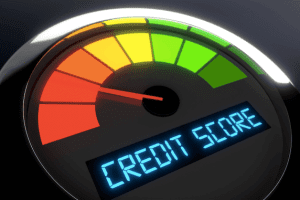Checking your credit score is a significant step toward understanding your financial health and making informed decisions about your credit. A credit score is a numerical representation of your creditworthiness, which lenders use to assess your likelihood of repaying borrowed money.
While there are misconceptions about the potential negative effects of checking your own credit score, it is crucial to dispel these myths and recognize the benefits of staying informed. In this comprehensive guide, Dollar Hand will explore the impact of checking your credit score, debunk myths and highlight the advantages of monitoring your credit health.

What Is A Credit Score?
A credit score is a numerical representation of an individual’s creditworthiness, providing lenders and creditors with an assessment of the likelihood that the person will repay borrowed money on time. Credit scores are used by financial institutions, lenders, landlords, employers and others to evaluate the risk associated with extending credit or entering into financial agreements with an individual. In essence, a credit score reflects an individual’s financial health and credit management history.
Credit scores are calculated based on various factors derived from an individual’s credit history, payment behavior, and financial activities. The score is typically generated by credit bureaus or credit reporting agencies, using mathematical algorithms that analyze the information contained in the individual’s credit report. Here is a closer look at the components that contribute to a credit score:
- Payment History (35%): This is the record of an individual’s payments on credit accounts, including credit cards, loans, and mortgages. Consistently making on-time payments positively impacts the credit score.
- Credit Utilization (30%): Credit utilization refers to the ratio of an individual’s outstanding credit card balances to their credit limits. A lower utilization rate is generally seen as favorable, as it indicates responsible credit management.
- Length of Credit History (15%): The length of time an individual has been using credit is considered. A longer credit history can positively influence the credit score, as it provides a more comprehensive view of their financial behavior.
- Types of Credit in Use (10%): The mix of credit accounts, such as credit cards, installment loans and mortgages, affects the credit score. A diverse mix of credit types can have a positive impact.
- New Credit (10%): Opening new credit accounts can temporarily lower the credit score due to inquiries and new accounts. Multiple recent inquiries can indicate a higher risk to lenders.
What Are The Credit Score Ranges?
Credit scores are typically expressed as a three-digit number, usually ranging from 300 to 850. The higher the score, the better the individual’s creditworthiness. Here’s a general breakdown of the typical credit score ranges:
- Excellent: 800 – 850
- Very Good: 740 – 799
- Good: 670 – 739
- Fair: 580 – 669
- Poor: 300 – 579

What Is The Importance of Your Credit Score?
Before delving into the implications of checking your credit score, it is essential to understand why your credit score matters in the first place. Key reasons are summarized in the table below:
| Lending Decisions: | Lenders use your credit score as a key factor in determining whether to approve your loan applications and what interest rates to offer. A higher credit score generally leads to more favorable lending terms, such as lower interest rates and higher credit limits. |
| Interest Rates: | Your credit score affects the interest rates you are eligible for. A higher score can translate to lower interest rates, saving you money over the life of a loan. |
| Credit Card Approval: | Credit card issuers use your credit score to decide whether to approve your application for a credit card and to set your credit limit. |
| Housing and Rentals: | Landlords and property managers often check credit scores as part of the rental application process to assess your reliability as a tenant. |
| Employment Opportunities: | Some employers review credit scores during the hiring process, particularly for positions involving financial responsibilities. |
Debunking Myths About Checking Your Credit Score
There are a couple of myths that might deter individuals from checking their credit score:
Myth 1 – Checking Your Own Score Harms It
Reality: Checking your own credit score is considered a “soft inquiry” or “soft pull.” Soft inquiries do not affect your credit score in any way. In fact, regularly monitoring your own score demonstrates responsible financial behavior.
Myth 2 – Frequent Checks Lower Your Score
Reality: Checking your own score does not affect it at all.
What Are The Benefits of Checking Your Credit Score?
Early Detection of Errors
By regularly reviewing your credit report and score, you can identify any inaccuracies, discrepancies or fraudulent activities. Catching these issues early allows you to take corrective measures to protect your credit.
Monitoring Progress
If you are actively working on improving your credit, checking your score helps you track your progress. As you make positive financial choices, you’ll likely see your score improve over time.
Identifying Areas for Improvement
Your credit score is based on various factors, such as payment history, credit utilization and credit mix. By knowing your score, you can identify areas where you can make adjustments to positively impact your credit health.
Loan Readiness
If you are planning to take out a loan in the near future, checking your credit score gives you an idea of where you stand and helps you understand the types of loan terms you are likely to qualify for.
Financial Awareness
Being aware of your credit score is an integral part of your overall financial literacy. It empowers you to make informed decisions about borrowing, spending and saving.
What Are The Best Practices For Checking Your Credit Score?
Good practises for checking your credit score include:
Use Reputable Sources: Obtain your credit score from reputable sources such as credit bureaus (Equifax, Experian, TransUnion) or financial institutions.
Regular Monitoring: Check your credit score regularly, but avoid excessive checking, as it is not necessary to monitor it daily.
Check for Free: Many financial institutions and online services offer free access to your credit score. Take advantage of these opportunities.
Understand the Factors: Alongside your credit score, understand the various factors that influence it, such as payment history, credit utilization and length of credit history.
Take Action: If you notice discrepancies or areas for improvement, take steps to address them. This might involve disputing errors, paying down debt or establishing a solid payment history.
Final Thoughts
Checking your credit score is a responsible and valuable action that contributes to your financial well-being. It empowers you with information that influences lending decisions, interest rates and various aspects of your financial life.
Debunking myths about the negative effects of checking your own score is essential for making informed financial choices. By regularly monitoring your credit score, you not only protect yourself from errors and fraud but also take proactive steps toward building and maintaining a healthy credit profile.
Was this article helpful?
Justine is a full-time writer with lots of expertise and a wealth of experience in the financial world. In particular, she specializes in household income and consumer finance across the United States. Follow her articles for useful advice and top tips, guides on how to save money and lots more.
